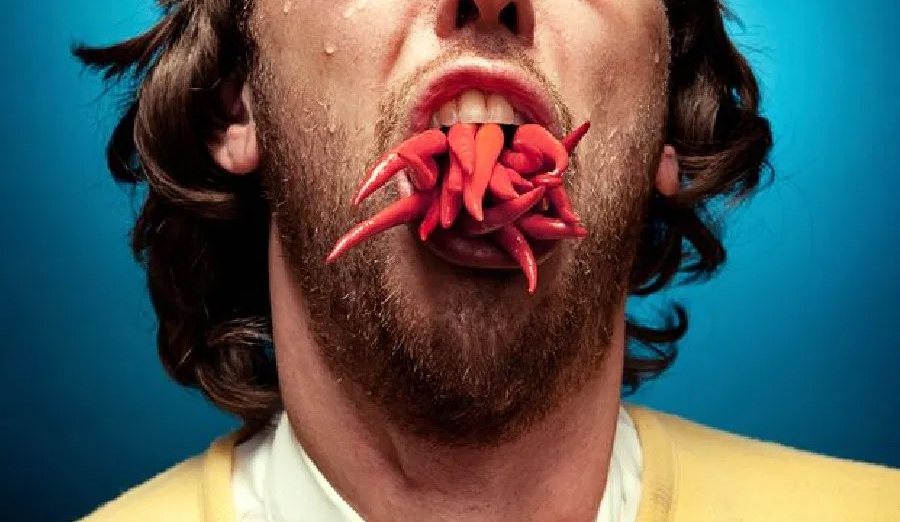Why Do Men Love Spicy Food So Much?
Hungry for some good musing about food and men? Check out this article from GQ.com. It suggests that men may define themselves by their tolerance for spice. The author wonders why this has become such a common trend in our gender. Does it make men look more travelled, cultured or classy? Or is it nothing more than a culinary dick-swinging contest?
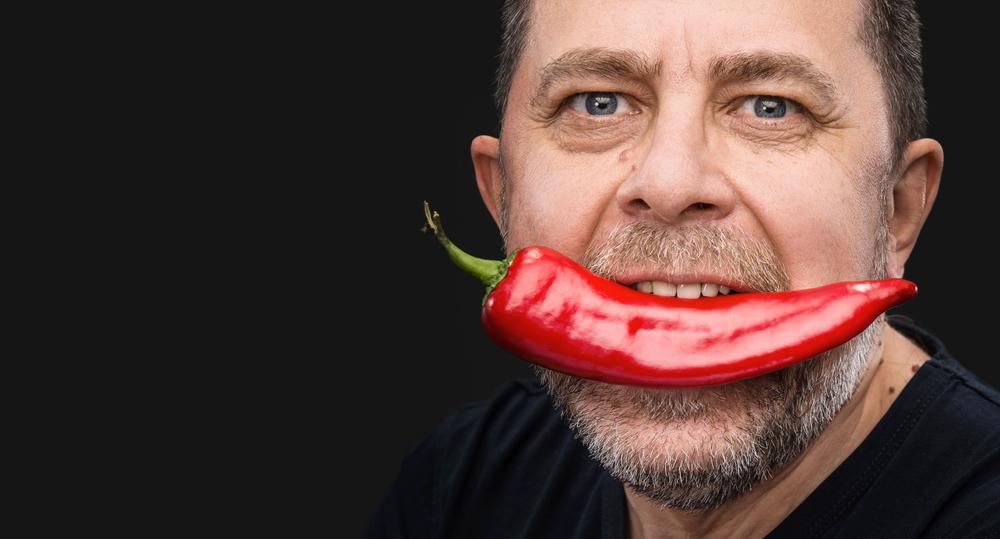
My dad is a big fan of spicy food. Growing up, I remember sitting at the dinner table, lips on fire, while he ate the ridiculously hot meal he’d just cooked without so much as a wince. Back then, I was much more into the Spice Girls than actual spices. I wondered what my dad liked so much about dishes that were so hot that they literally hurt to eat – even if he insisted his curry only had “a little bit of heat to it”.
As an adult, I’m slightly disturbed to admit that I now find myself replicating this strange behaviour. I often sneak extra chilli into dishes I’m making and, even though I know it’s ridiculous, I do find myself judging people who don’t enjoy spicy food as much as me. The superiority I feel when someone (my boyfriend) says a dish is “a bit too spicy” while I’m cool as a cucumber? Unparalleled.
Worshipping at the altar of spice is something a lot of men seem to do. There’s science behind this: a 2014 report published by researchers at the University Of Grenoble linked a self-described love of spice to supposedly “alpha male” traits and high testosterone levels. Surely “spice guys” have got to be more complex than that, though. (Me? An alpha male? Unlikely.)

This narrative is complicated by a 2015 study conducted by Pennsylvania State University, which examined how factors such as gender and personality might influence our tastes. A total of 246 test subjects were questioned about their favourite foods, took a personality survey and then sampled a variety of intense flavours. These included capsaicin, an active component that gives chilli peppers their spice. It turned out that men were much more likely to say they enjoy spicy food than women – no surprises there. But there’s a twist: in the actual taste test, the female participants were more likely to report actually enjoying the super-hot taste of the capsaicin, whereas the men enjoyed it less. The men were claiming to love spicy foods, without actually liking the taste as much as the women.
So why might some men be keen to say they like spicy food? The perceived association with testosterone and “alpha male-ness” (whatever that is) could certainly be a factor. Studies have also found that it could be linked to behavioural factors such as risk-tasking, attention-seeking and thrill-seeking – traits young men have been found to be particularly prone to.
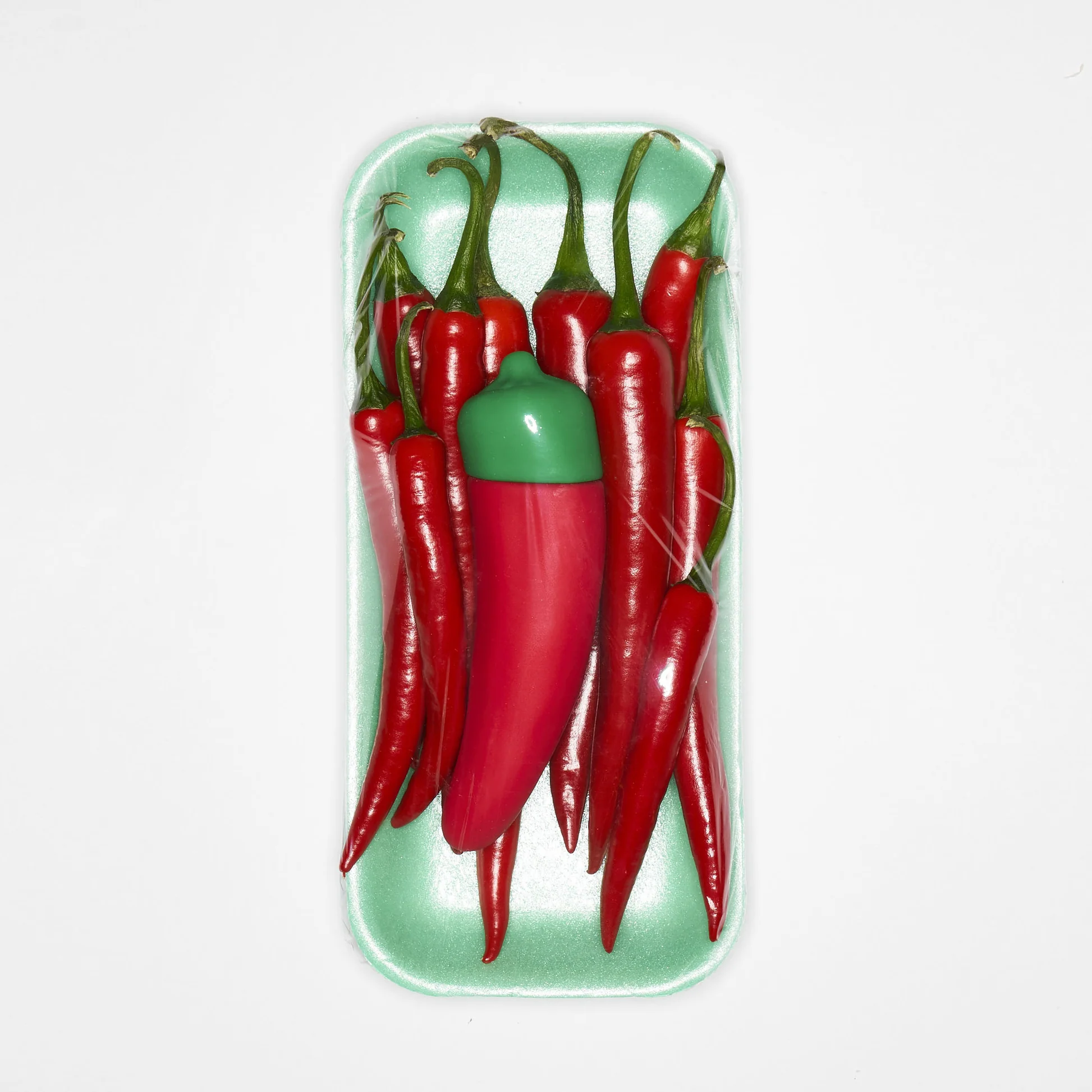
Writer Tom Usher is a self-confessed thrill-seeker. He’s the star of Challenge Man, a Vice UK video series that sees him take on various extreme and bizarre challenges in the hopes of becoming “a legend”. Usher remembers getting into spicy foods as a teenager, when he first discovered curry. Now he eats extra-hot dishes regularly and his video challenges often include food: he’s done “competitive nettle eating” and he ate a “monster” fry-up inside a hollowed-out loaf of bread. In lockdown, he tried the world’s spiciest curry and did the splits live on his Twitch channel.
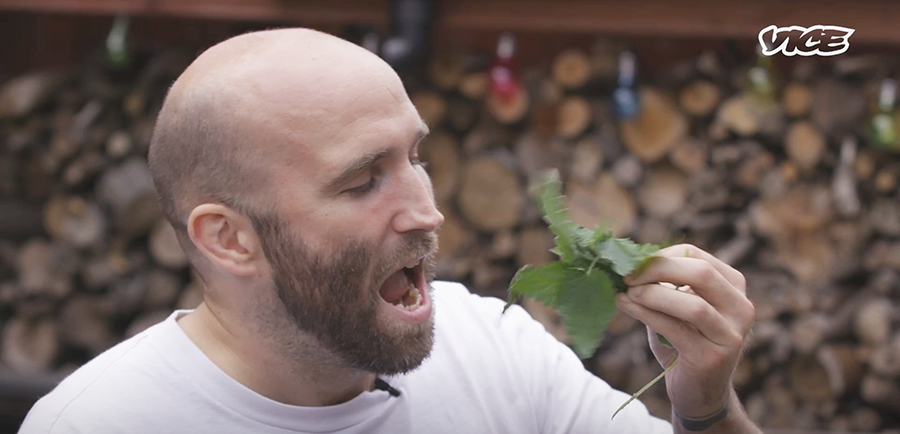
Usher is comfortable admitting there’s an attention-seeking element to these challenges. “It’s a bravado thing: I’ve never had a problem with being seen as an idiot or a clown for other people’s amusement,” he says. “Eating big stupid things and fucking myself over for a few laughs is probably just an extension of that.”
Usher tells me that the world of “challenge” eating is becoming gradually less male-dominated (he even sent me a video of Leah Shutkever, the UK’s top female competitive eater, who’s got more than 100,000 followers on Instagram). But it seems like it’s much more normalised for men to make a spectacle of themselves through food, from shows like Man V Food to that episode of The Simpsons when Homer sends himself on a hallucination trip after eating Guatemalan “insanity” peppers at Springfield’s annual chilli cook-off. Usher thinks patriarchy is partly to blame for this dynamic. “Women are so castigated for their looks and behaviours in public,” he says. “They aren’t allowed to just let loose and be arseholes in the same way men are, including what and how they eat. Men are allowed to be dickheads without a care in the world.”

It’s true that men and women are encouraged to approach food differently from a young age. Young men are praised for eating so they can “grow”, while women are subtly encouraged to prioritise their diet and appearance over eating for pleasure. Studies suggest that men are more likely to over order on first dates (and order more meat dishes too), whereas women are more likely to order smaller dishes like salad to appear dainty and feminine. Despite the fact that women were traditionally expected to cook for their families, there’s a long tradition of men being the arbiter or what “good food” is, from Henry VIII’s legendary lavish feasts to Gordon Ramsay making a career out of going into peoples’ restaurants and screaming at them, the depressing dominance of white male food critics and the strange societal norm that suggests men’s brains are better wired to grill burgers on a barbecue. This sense of superiority likely contributes to men thinking they “know best” or somehow have ownership over spice too.
It also feels like there’s a class element at play with “spice guys”. Loudly professing a love of spice might be a way for some men to project the image that they’re “well travelled”, educated and cultured. Jonathan Nunn, editor of Vittles – a newsletter of food and culture writing from across the world – thinks the class dynamics of spicy foods have shifted slightly. “In the 1990s, ordering a vindaloo or a phaal was associated with lad culture and would never have been seen as a ‘cultured’ thing to do,” he says. Nowadays, though, he thinks a love of spicy food can confer a cultural or class superiority because “it grants the eater access to a wider sample of cuisines”.
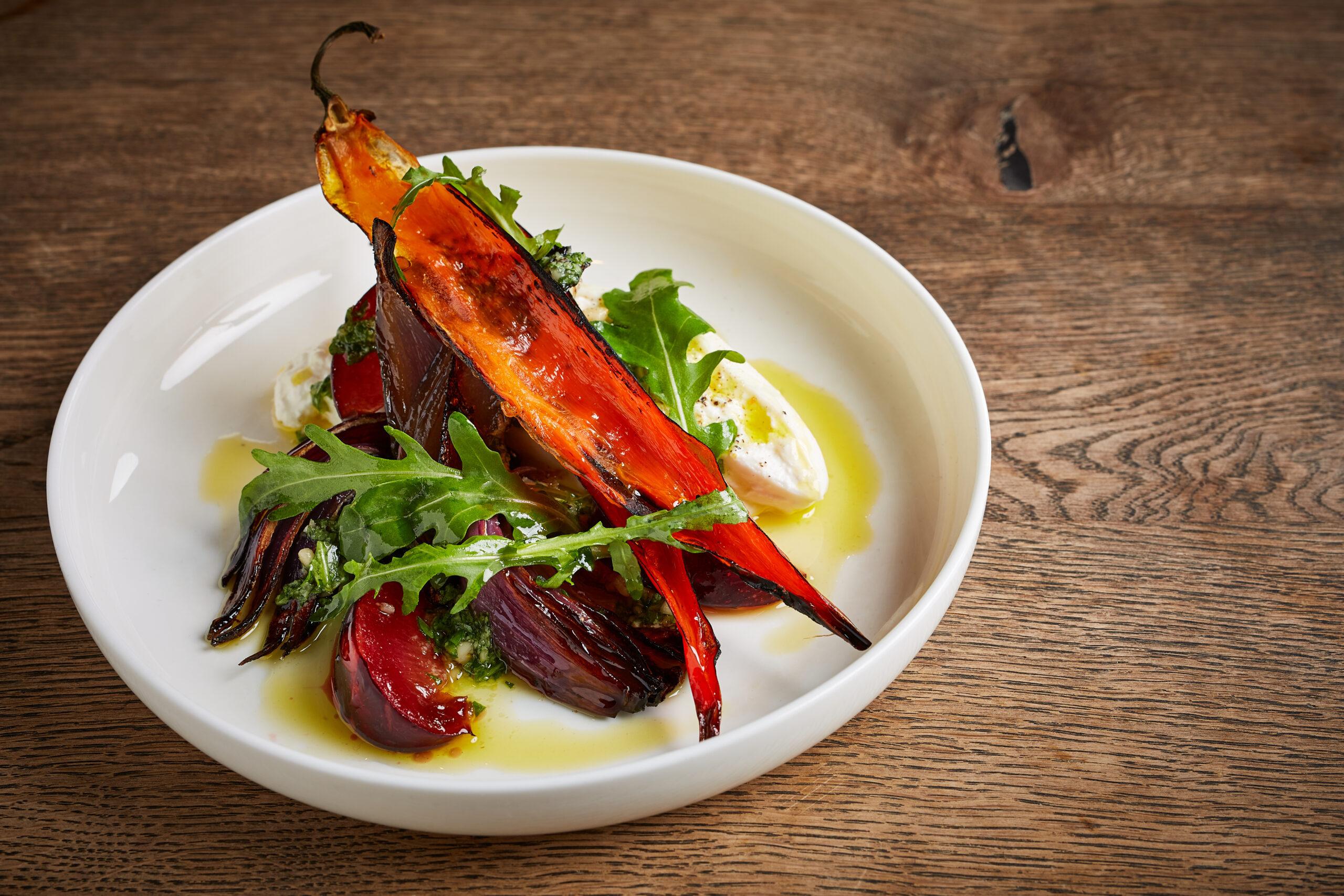
Since the 1990s, chicken tikka masala and korma – two very mild dishes – have become Britain’s most-ordered curries. The former is often voted Britain’s favourite dish. Online, there’s been a reaction to mildness being so mainstream: Nando’s “lemon and herb” seasoning has become a byword for basic-ness and general bad vibes. Black Twitter frequently mocks foods that are stereotypically associated with white people – such as pale, unseasoned chicken – for being bland and tasteless. “Mayonnaise” has emerged as a slang term for people who are boring (depending on who is using it, it’s mostly aimed at white and/or straight people who are seen as conventional and dull). This jibe is a double entendre: the condiment’s appearance is colourless, but one of mayonnaise’s functions is to cool and un-spice food.
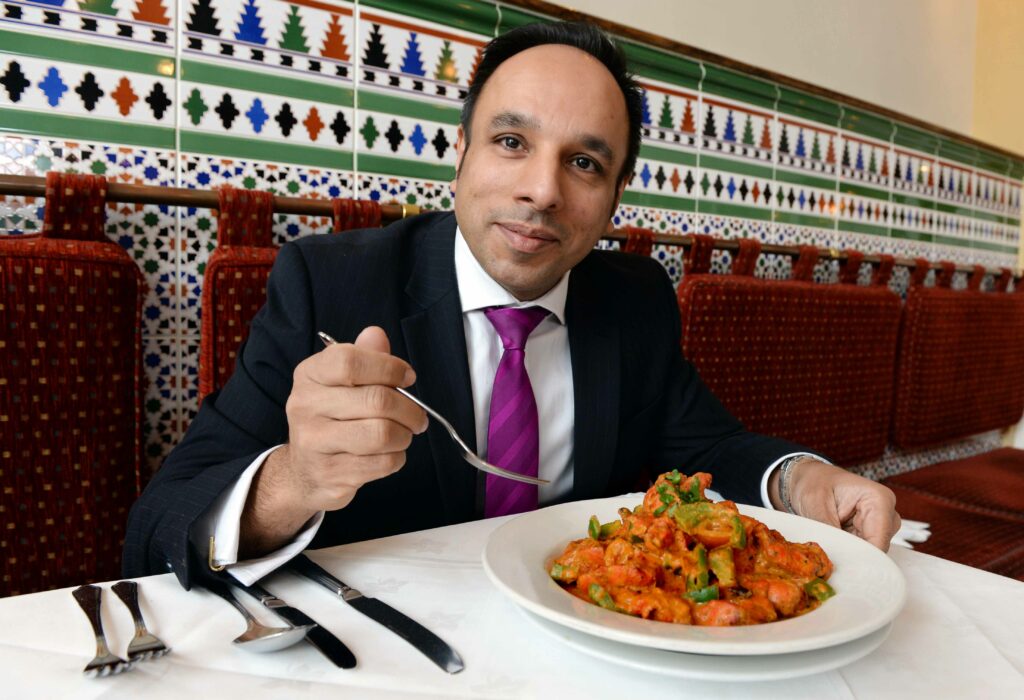
It’s fair enough that some people of colour might find it funny to mock bland food. After all, it’s often a response to racism directed at certain cuisines and delicious national dishes being either unfairly overlooked or badly altered to fit in with mainstream Britain’s love of mild, palatable dishes. But in an environment where mildness, not spice, is more likely to be associated with supposedly basic and uncultured people, some men might use a love of heat to set themselves apart from the masala-loving masses.
When it comes to the co-opting of spicy food as “masculine”, the extent of this can depend on location. Nunn says dishes somehow being associated with being “a man” happens in many cultures, from the American love for huge steaks to mannish water (a goat soup that’s believed to be an aphrodisiac) in Jamaica. “What’s interesting is that the association of spiciness with masculinity and machismo is mainly restricted to colder countries,” he says. “The machismo surrounding chilli isn’t that prevalent in Spain or Italy and in cultures where spicy food is the norm men tend to be much more honest about their spice tolerance, but in the UK it becomes a ‘test’. Perhaps it’s about contrasts: the blander a national cuisine, the more the chilli pepper poses a challenge?”
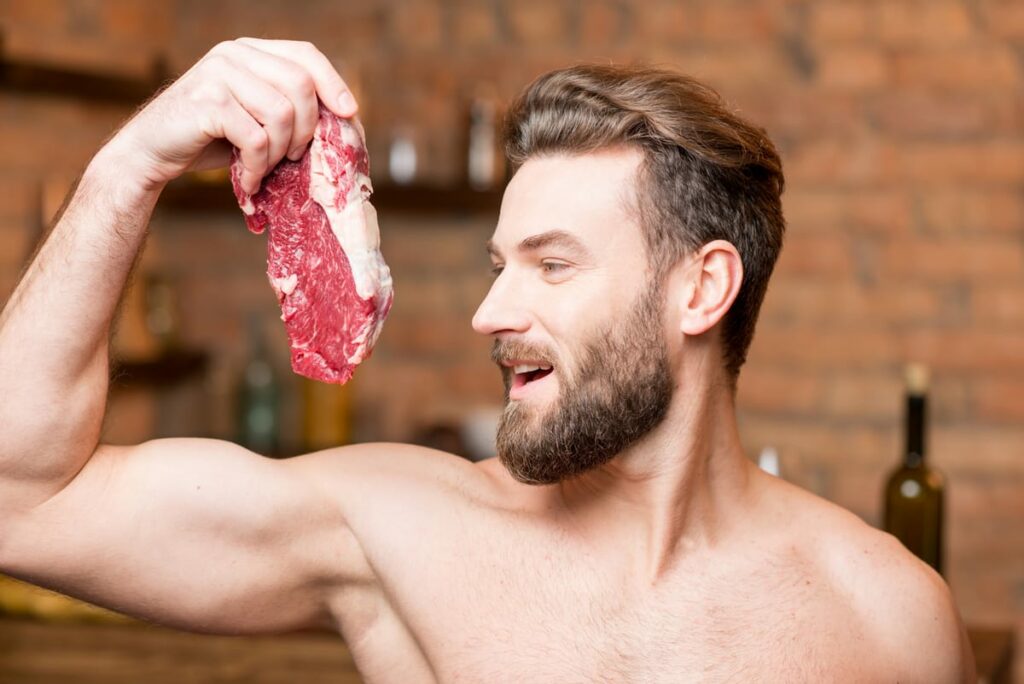
“Challenge” is a word it seems we keep coming back to. Feroz Gajia, owner of Bake Street restaurant in Stoke Newington, London, recently added a “Nashville Hot Chicken” sandwich special to his menu. It quickly became a star attraction with food lovers and writers and it was even described as “the best fried chicken dish in London right now”.
Gajia thinks the challenge of a hot and spicy item entices some people who are looking to “prove their worth”. The excitement behind new hot dishes, he thinks, is driven by spicy foods becoming more accessible because of the popularity of hot sauce condiments. As for a gender split, Gajia says there is a “core white male 25-35 demographic that are most drawn to the Nashville Hot Chicken”. But overall it evens out: “Women will eat the hottest items when it isn’t the selling point, for example the hottest salsas for our tacos, because they enjoy that kind of heat.” So once again, it seems that women like spicy foods just as much as men, but they just don’t feel the need to tell everyone about it or turn it into a personality trait.
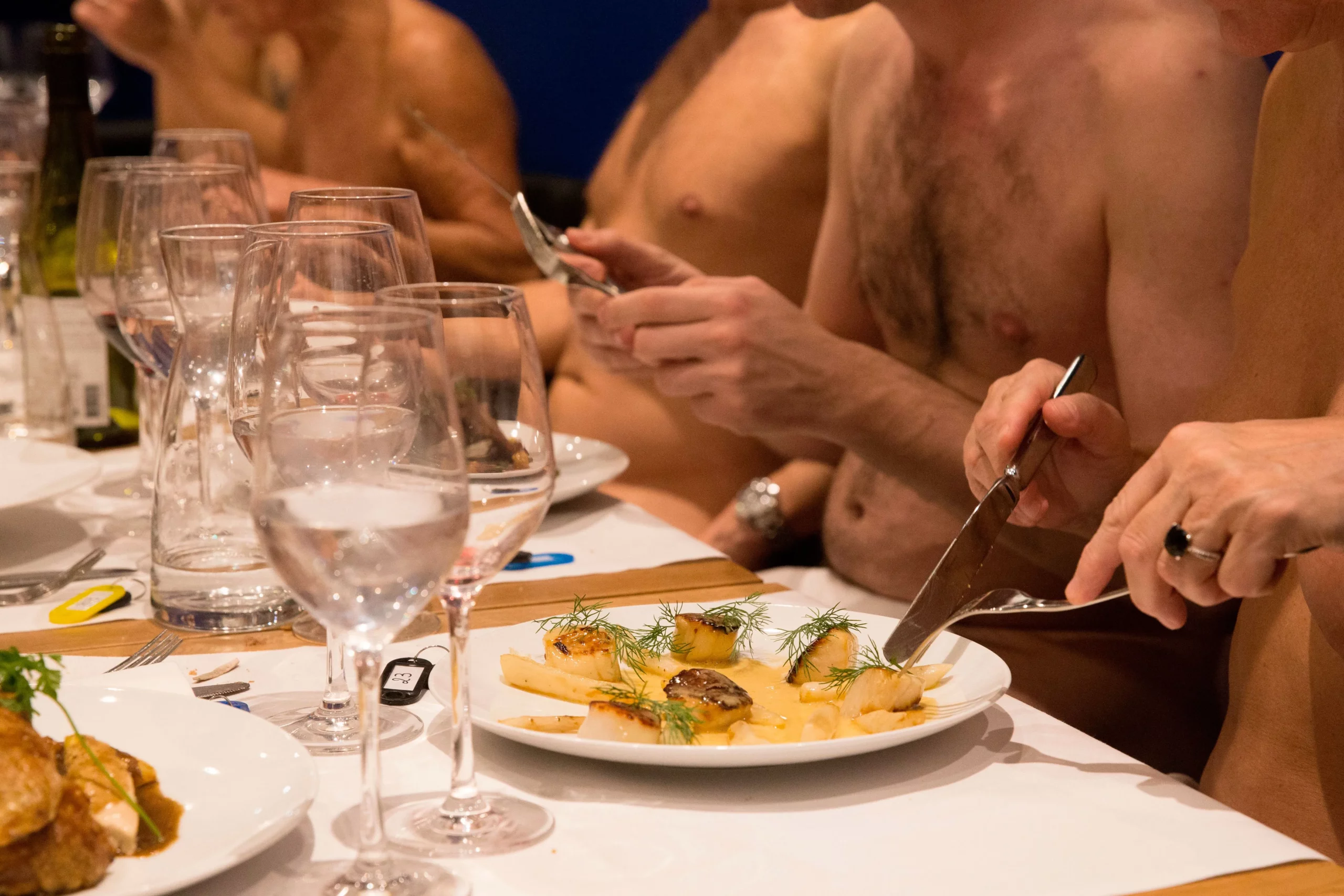
Ordering a meal that’s so hot it makes your eyes water doesn’t make a man more “alpha” male, more travelled, cultured or classy. It could suggest a desire to present himself that way, though. For the “spice guys” we most often see engaging in this culinary dick-swinging contest – including my own strange superiority complex when someone orders a korma – it’s probably more about needing an ego boost or some attention. Whether or not a man likes spicy food doesn’t signify all that much, but feeling the need to loudly shout it from the rooftops? That speaks volumes.
So… what do you think? Did you ever eat very spicy food and then notice reactions by friends? Do you enjoy meals that “burn” the sense of taste? Is spicy food a hard limit of yours? Tell us in the comments below.

